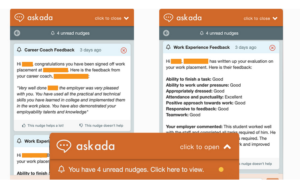
There continues to be a flurry of newspaper articles and studies of teh effect of automation and Artificial Intelligence on employment and jobs. There are different predictions about the scale of the change and particularly about the numbers of jobs which are at risk. One cause of the difference is disagreements about how many new jobs will be created, another is the speed of change. This may in part depend on whether employers choose to invest in new technologies: in teh UK productivity has remained persistently low, probably due to low wage rates.
What we do know is that organisations will need to cope with many of the changes associated with changes in the skill mix required of their employees through learning through challenging work, training and continuing professional development etc. We also know that the changes mean it is difficult to imagine exactly how the labour market will look in say ten years but understanding the labour market can help people make sense of the context in which they are working or are seeking to work
At the same time we do not know the exact skill demands associated with unforeseen changes in the labour market, but we do know that new technical skills will be required, individuals and firms may need to specialise more to compete in global markets, and that demand will grow for ‘soft skills’ which are very difficult to automate, including complex social skills, cultural and contextual understanding, critical thinking, etc.
Yet this debate is not new. In the 1990s there were similar debates around teh move towards the ‘knowledge society’. At that time it was being predicted that low skilled work was set to rapidly decline, a prediction that pre-dated the rapid expansion in low skilled (or at any rate low paid) employment in the service sector. the answer at that time was seen to be promoting transversal skills and competences, variously called core skills, core competences etc. These emhpasised teh important of literacy and numeracy as well as communication skills and Information Technology. The problem was that such skills and competences were, in general abstracted from the curriculum as stand aone areas of learning, rather than being integrated within occupational learning. Of course, the other tendency n many Euroepan countries was to increase the number of young people going to university, at the expense of vocational educati0on and training.
What was needed then as now was to develop technical skills coupled with soft skills. Mastery of a technical skill is itself be a transferable skill whereby other technical skills can be developed more quickly as they are required . Developing latest industry-integrated technical skills is easiers if an underpinning technical knowledge base has been developed through more traditional educational provision. Retraining while in-work is very much easier than getting redundant people back into work.
Germany by Gerald Heidegger and Felix Rauner who looked at occupational profiles. Occupational profiles are in effect groups of competencies based on individual occupations. In Germany there are over 360 officially recognised occupations.
As long ago as 1996, Gerald Heidegger and Felix Rauner from the University of Bremen were commissioned by the Government of Rhineland Westphalia to write a Gutachten (policy advice) on the future reform and modernisation of the German Dual System for apprenticeship training.
They recommended less and broader occupational profiles and the idea of wandering occupational profiles. By this term they were looking to map the boundaries between different occupations and to recognise where competences from one occupation overlapped with that of another. Such overlaps could form the basis for boundary crossing and for moving from one occupation to another.
Heidegger and Rauner’s work was grounded in an understanding of the interplay between education, work organisation and technology. They were particularly focused on the idea of work process knowledge – applied and practice based knowledge in the workplace. This was once more predicated on an idea of competence in which the worker would make conscious choices of the best actions to undertake in any particular situation (rather than the approach to competences in the UK which assumes there is always a ‘right way’ to do something).
Per Erik Ellstroem from Sweden put forward the idea of Developmental Competence – the capacity of the individual to acquire and demonstrate the capacity to act on a task and the wider work environment in order to adapt, act and shape (design) it.
This is based on the pedagogic idea of sense making and meaning making through exploring, questioning and transcending traditional work structures and procedures. Rauner talked about holistic work tasks, based on the idea that a worker should understand the totality of the work process they are involved in.
In this respect it is interesting to see the results of recent research by Burning Glass, a company using AI and big data techniques to analyse labour market information. They say that in examine the role of Receptionist in Burning Glass Technologies’ labor market analysis tool, Labor Insight, “we can see that receptionists have a variety of related jobs they can do based on their transferable skills. Transferable skills are types of skills that a worker can use across many jobs, allowing them to more easily transition into a new role. A receptionist has many transferable skills such as administrative support, customer service, scheduling, data entry, and more. These transferable skills will allow a receptionist to move into related jobs such as Legal Secretary, Executive Assistant, or File Clerk.
According to Labor Insight, a Receptionist can transition into a Medical Secretary role which offers a higher average salary and is projected to grow by 22.5% in the next 10 years. This also offers an opportunity for the receptionist to venture into a new industry, allowing them to explore new health care roles such as Nursing Assistant, Emergency Room Technician, or Patient Service Representative.
The transferable skills that Burning Glass talk of are very similar to Rauner and Heidegger’s wandering occuaptional profiles. Rather than. as some commentators have suggested (see for example Faisal Hoque), a return to humanities based subjects in providing abstracted knowledge as the basis for future qualifications, the need is to improve vocational education and training which allows workers to understand the potentials of integrating automation and AI in the workplace. Creativity is indeed important, but creativity was always a key aspect of many jobs: creativity is part of the work process, not an external skill.


 The International Labour Organization (ILO) have launched a E-Discussion on Continuing online learning and skills development in times of the COVID-19 crisis. The discussion started on 27 March and runs to 9 April.
The International Labour Organization (ILO) have launched a E-Discussion on Continuing online learning and skills development in times of the COVID-19 crisis. The discussion started on 27 March and runs to 9 April.
